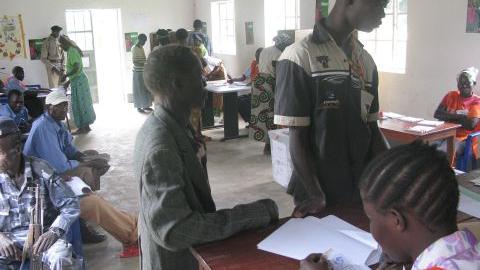Moses Loboyong is no run-of-the-mill first-time voter in Sudan's first national multi-party elections in 24 years. He is a deaf-mute resident of the Central Equatoria State county of Kajo Keji, and when the time came to cast his ballot at the Mondikolok Community Centre polling station, Mr. Loboyong said he felt a special kind of excitement.
"I lived in Adjumani Refugee Settlement Camp (in Uganda) for about 10 years because of the war in Sudan," he said, communicating through a mixture of gesticulations and etchings in the dirt outside his grass-thatched tukul. "I am expecting a good result from my votes so that we can live in a war-free Kajo Keji and a peaceful Southern Sudan as a whole."
The 25-year-old man says he received an informal course in voter education from his peers, who showed him the symbol for each candidate and political party and walked him through a complex voting process that has bewildered even his university-educated countrymen.
Mr. Loboyong demonstrated how he marked his ballot by drawing a long mark on the ground.
"I chose one (candidate) from each paper and put a mark on it," he explained. "My friends told me earlier that if I put two marks in each paper, the paper would be null and void.
"I did not make such a mistake," he added with an air of satisfaction.
Kenyi Joseph shared Mr. Loboyong's enthusiasm and expressed his hope that the balloting will serve as an important stepping stone towards a democratic transformation in Sudan.
"I do believe that I have voted wisely because I ticked leaders of my choice," said the 34-year-old voter. "I pray for my candidates to pass."
Madam Lillian's motives for going to the polls in Kajo Keji this week were every bit as important as they were straightforward.
"I am voting because I do not want another war," said the 49-year-old voter. "I am tired of war now."






